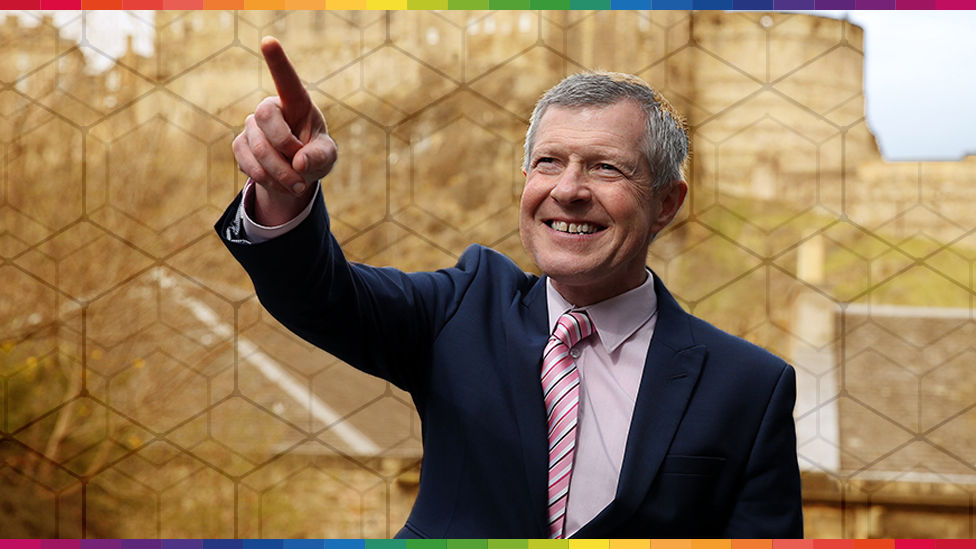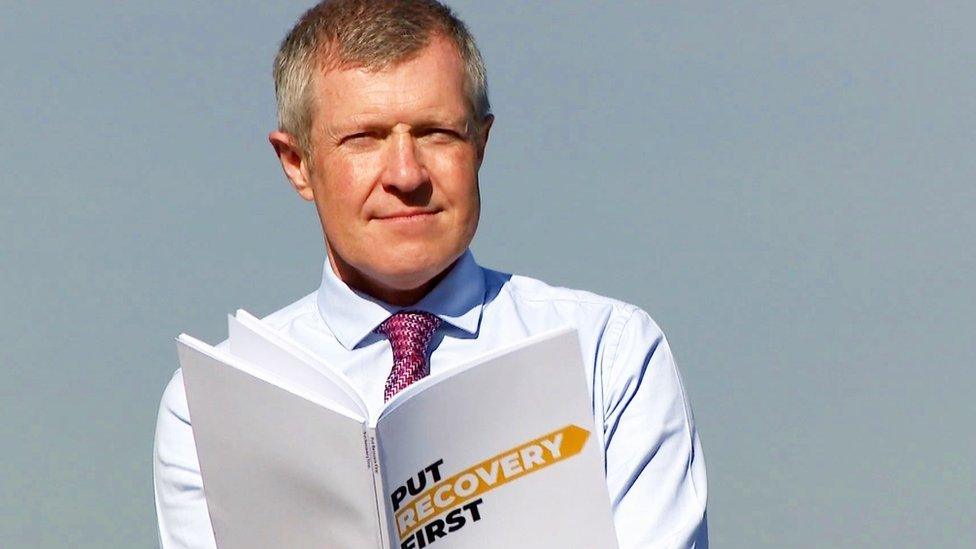Scottish election 2021: Liberal Democrat manifesto pledges to 'put recovery first'
- Published
Scottish Lib Dems pledge to prioritise the recovery from the pandemic
The Liberal Democrats have launched their Holyrood election manifesto with a pledge to prioritise the recovery from the Covid pandemic.
Party leader Willie Rennie said another independence referendum would "drag the country down" during the worst health and economic crisis in a century.
He said the Lib Dems would instead focus on jobs, mental health, the NHS, schools and the climate crisis.
The party also said it was confident of winning seats from the SNP on 6 May.
The manifesto again puts a heavy focus on mental health, which has been a key issue for the Liberal Democrats in recent elections.
The party's plan includes training more mental health specialists for community centres, hospitals, workplaces and schools, and ensuring that 15% of new health spending is on mental health.

SCOTLAND ALERTS: Get extra updates on BBC election coverage

It also proposes an urgent action plan to put help the NHS recover after the pandemic, with a wider range of specialists, diagnosis and treatment in local communities.
The manifesto also includes an "education bounce back" plan, which the party says would address the "public anger with the wide poverty-related attainment gap left by the SNP in education".
It calls for more in-class support for children who need it, alongside a guaranteed job for every teacher and an extension of free early learning and childcare to include two-year-olds.
There would be a renewed effort to raise literacy and numeracy standards., and children would have play-based education until the age of seven, based on the Nordic model.

SCOTLAND'S ELECTION: THE BASICS
What's happening? On 6 May, people across Scotland will vote to elect 129 Members of the Scottish Parliament (MSPs). The party that wins the most seats will form the government. Find out more here.
What powers do they have? MSPs pass laws on aspects of life in Scotland such as health, education and transport - and have some powers over tax and welfare benefits.
Who can vote? Anyone who lives in Scotland, is registered to vote and aged 16 or over on 6 May is eligible. You can register to vote online, external.

The manifesto also says business needs greater certainty in the future after "years of division over referendums and the shock of the pandemic".
The party's policies include a job guarantee for every 16-24 year old, and a new Scottish Training Bonds scheme, worth up to £5,000, to help people change career.
High street businesses would be offered tax cuts to help them compete with online retailers.
The Liberal Democrats say they want to help give Scotland "the most diverse business culture in Europe", to encourage more women into business and to ensure the country is an "attractive place to live and work for people who come from the rest of the UK, the EU and elsewhere."
And the manifesto also sets out new steps to tackle the climate emergency, including creating a million warm homes with zero emissions in the next ten years, switching transport to electric power and restoring nature.
Election 2021: How does Scotland's voting system work?
In his foreword to the manifesto, Mr Rennie said most people - regardless of their views on independence - would not want want a referendum to held in the wake of the worst health and economic crisis in a century.
He added: "Now is not the moment to carry on the poisonous and bitter battle between the SNP and the Conservatives and between the various factions of the nationalist movement, which is dragging Scotland down.
"People desperate for work, patients in our NHS and pupils in our schools can't be left to wait as politicians return to arguments over independence.
"People are desperate for a parliament that puts our differences on independence to one side and puts recovery first."


In one of the more niche sections of the Liberal Democrat manifesto, the party proposes reforms to help hold the next Scottish government to account.
They want a new "contempt of parliament" rule to apply if ministers try to ignore votes at Holyrood - arguing that a minority government should respect the will of a majority in Parliament.
However, the Lib Dems are firmly opposed to another independence referendum no matter what the arithmetic after the election.
Asked if a Holyrood majority for indyref2 should be respected, the party leader Willie Rennie insists he will not deviate from his opposition.
It was the Lib Dems in coalition with the Conservatives in the UK government that agreed the terms of the 2014 referendum.
More than six years later, as Scotland emerges from the pandemic, the party argues that every ounce of political energy should be spent on Covid recovery and that another referendum would weaken that effort.

Both the SNP and Scottish Greens want a referendum if there is a pro-independence majority in the Scottish Parliament after next month's election.
When she launched the SNP manifesto on Thursday, party leader Nicola Sturgeon said it would be "dereliction of duty" to hold it before the pandemic had ended.
But she said it was "vital" that people who live in Scotland were able to decide the future that they want once the Covid crisis is over.
The Greens also want to see a referendum held during the next Holyrood term, arguing that it would be "our route back to EU membership" and would give Scotland "the powers and potential to be a leader in the transition to a zero-carbon economy".
But the Scottish Conservatives say that holding a referendum would "create a new crisis at the earliest opportunity", and that the country would be tackling the health and economic fallout from the pandemic for years to come.
Scottish Labour also opposes a referendum, and says preventing a pro-independence majority is crucial as it will force the Scottish government to focus entirely on the coronavirus recovery rather than on the constitution.

POLICIES: Who should I vote for?
CANDIDATES: Who can I vote for in my area?
PODLITICAL: Updates from the campaign

- Published16 April 2021

- Published16 April 2021

- Published16 April 2021

